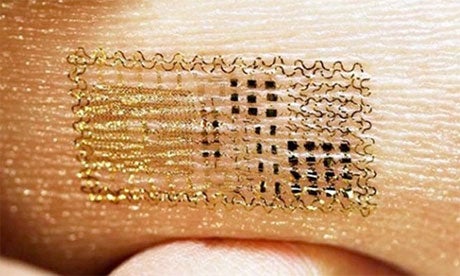Motorola's electronic throat tattoo could act as a mobile phone or a lie detector
The patent filing for an "electronic skin tattoo" could connect to a smartphone or be used to identify individuals "engaging in speaking falsehoods"

Feel like you couldn’t cope with being more than a few feet away from your smartphone? Well Motorola might have the solution, filing a patent for a throat tattoo that incorporates a microphone and power supply.
The patent for “coupling an electronic skin tattoo to a mobile communication device” includes an embedded microphone, a ‘transceiver for enabling wireless communication’ and a power supply that could run from a battery or solar power.
The technology seems to be a combination of the trend for second screen devices such as the Galaxy Gear smartwatch that act as a mediator for our smartphones, and the developing field of electronic tattoos.
In 2011, John Rogers of the University of Illinois unveiled a sensor (see picture above) thinner than a human hair that could be applied to the skin for long-time use, monitoring the wearer’s heart and brain and relaying the information to medical professionals.
Motorola’s patent application though also suggests uses beyond simple communication, mentioning the inclusion of a “galvanic skin response detector” that might turn the device into a lie-detector.
“It is contemplated that a user that may be nervous or engaging in speaking falsehoods may exhibit different galvanic skin response than a more confident, truth telling individual,” reads the patent.
The idea of an un-removable tattoo being applied as a permanent lie-detector sounds like a sci-fi subplot, but apparently it’s not beyond the remit of a patent application.
Subscribe to Independent Premium to bookmark this article
Want to bookmark your favourite articles and stories to read or reference later? Start your Independent Premium subscription today.

Join our commenting forum
Join thought-provoking conversations, follow other Independent readers and see their replies